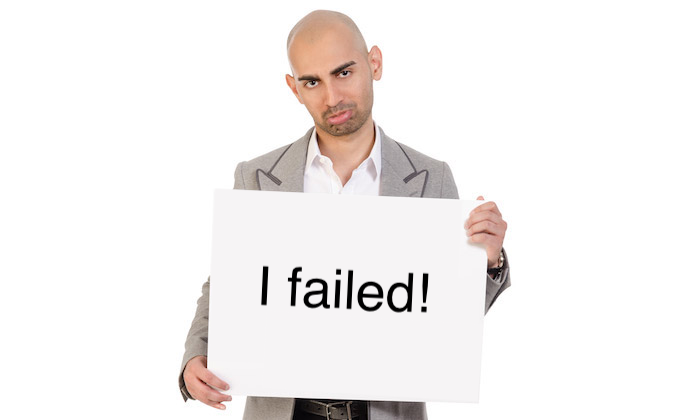
Did you know that I’ve failed at SEO before?
No, I’m not talking about when I first started my career. This was when I knew SEO like the back of my hand.
I’m talking about when I was good enough to get sites ranked on page 1… that’s when I really failed at SEO.
And boy was it was heartbreaking!
Let’s just say this: I was able to rank a site on page 1 of Google for the term “online poker” and then my rankings tank. Not because of a Google penalty but from something I never expected.
But before I go into what I learned, let’s first go over how it all started…
Online Poker Lowdown
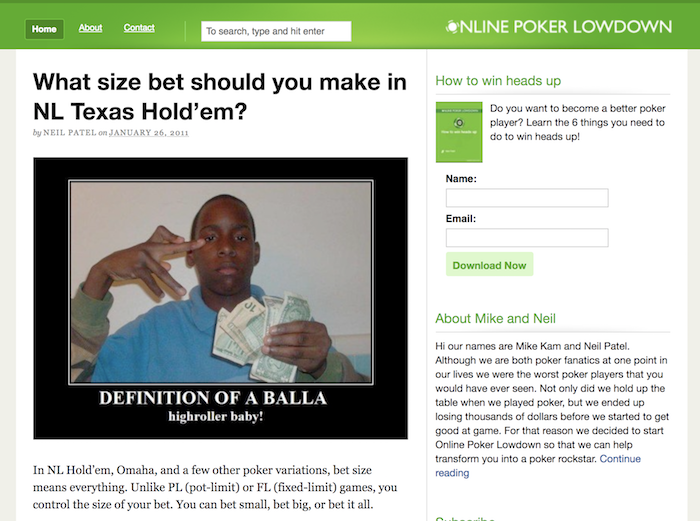
Back in 2010, I bought an old poker site that was never really updated. It was called Online Poker Lowdown. Funny enough, the site is still up today even though I don’t own it.
The reason I bought it was because it ranked in the top 1,000 for the term “online poker.” The site just needed some updating.
If you are wondering how I found it, I was Googling for the term “online poker,” and I hit up a dozen or so sites who were ranking between page 30 and 100 for the term and bought the cheapest one.
And the reason I went after the poker industry was that back then a lot of us thought it was going to be legalized in the United States. So, if I could rank at the top, I would have a site that would eventually be worth a lot of money… assuming I was patient.
My first blog post
I published my first blog back in November 2010. It was called, the top 5 poker mistakes you’ll make.
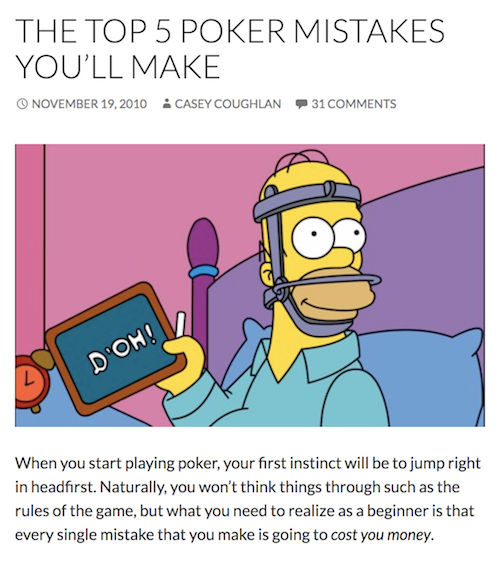
The blog post wasn’t the standard 2,000 plus words that I write these days, but it was long enough for 2010. Keep in mind, there weren’t as many blogs back then so it wasn’t as competitive.
But this blog post did well, there were 31 comments:
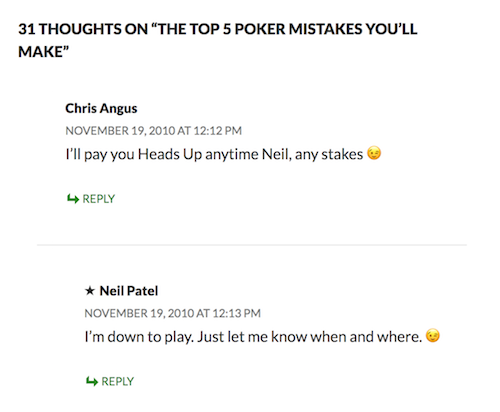
And over time, the blog continually grew as I published more content.
My path to growing Online Poker Lowdown
I wish I had the analytics for the site still, but I don’t.
If my memory serves me correctly (and usually it does), the site capped out at roughly 41,000 unique visitors a month all from 104 blog posts.
And at one point I even ranked number 7 on page 1 for the term “online poker.”
The best part of all, it didn’t even take me a year to achieve those results.
Keep in mind that back then you could get rankings much faster than you can now. But still, it was pretty fast even for 2010/2011.
So how did I get my rankings and traffic so high in such a competitive space?
It wasn’t the content, it was the backlinks.
Google’s algorithm was much easier to predict back then and links impacted rankings more than anything else.
Now you are wondering how I got all of these people to link to me. Like today, no one wanted to link to poker sites… even back in 2011.
It was from writing posts like this.
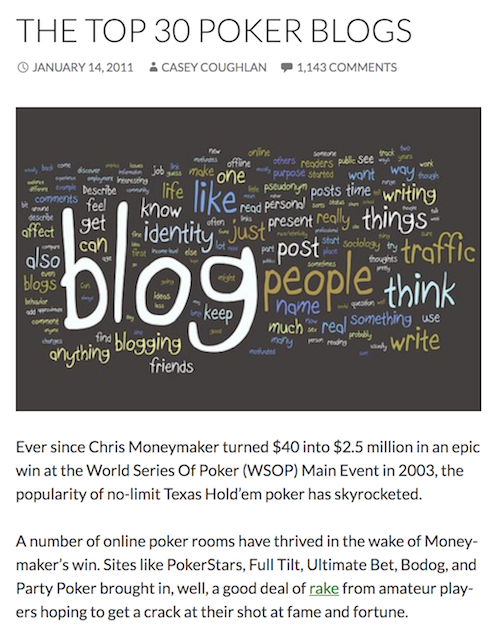
By creating list-based posts of the top blogs within the poker industry, it was easy for me to get them to link back to me.
If you want to do something similar, it’s not as simple as writing a blog that includes the top 30 or even 100 blogs within your industry.
- Your post needs to be detailed – I know the example I showed on Online Poker Lowdown isn’t detailed. Times have changed. If your list-based post isn’t as in-depth and thorough as possible it won’t work nearly as well. For example, if you list out the pros and cons of the site and why you included it, that would be much better than just writing a few paragraphs and linking to dozens of sites.
- You need to include images – when listing out the top 100 blogs within your industry, make sure you include an image for each blog. This one little thing will add a bit of flair to your post.
- Your list needs to be long – a top 30 list isn’t as effective as writing a top 100 or top 500 list.
- Your list needs to be of bloggers – don’t list out the top 100 sites, it needs to be blogs. Bloggers are much more open to linking back to you.
Once you publish your list-based post you’ll need to drive a ton of traffic to it within 7 days of it being published. Back in the day, I drove traffic to the Online Poker Lowdown top 30 poker blogs post by paying for StumbleUpon ads.
But that is no longer an option as StumbleUpon doesn’t exist anymore.
You can still drive traffic through Reddit ads, Quora ads, Twitter ads, and Facebook Ads though. These options are technically better than StumbleUpon as they have better targeting options.
Even if your blog is popular, I would still recommend that you pay for ads… even if it is just 50 dollars. By paying for ads, it ensures your blog post gets read by hopefully a few thousand new people if not more.
You don’t need the highest quality traffic either, you just need visitors who are somewhat interested in your content.
The more people that read your post, the more will click through to one of the top blogs you mentioned. And the more people that click through to their site, the more of them will notice your blog when they analyze their referral traffic.
In other words, when they see a spike in their Google Analytics account, they’ll notice that the extra traffic came from your blog.
This will put your blog on their radar!
Now, on the 7th day of your blog post being live, you’ll want to email each website that you included.
The email should go something like this…
Hey John,
I just wanted to congratulate you for having an amazing blog. I loved OnlinePoker.org so much that I included in my list of the top 100 poker blogs. [insert link to your blog post]
There are so many junk sites in the poker space, but yours truly stands out. I love how you go into great detail about poker strategy and you have some infographics breaking down how casinos make their money.
Hope you got some nice traffic from me… the blog post was pretty popular and well received by the poker community.
If you want to showcase your accomplishment, feel free and mention it to your readers. Or you can just place this badge on your blog.
[insert embed code for the badge, which should also contain a link back to your site]
Cheers,
Neil Patel
You’re going to have to customize the email and then, of course, make a badge that looks much nicer and is smaller. But you get the point.
This one strategy really boosted my backlink count and skyrocketed me to the top. It still works today, but if you are going to leverage it there are a few things you should know:
- Your post needs at least 10,000 visitors – only a portion of your visitors will click through to some of the top sites you mentioned. The more people that read your post the better, so make sure to drive at least 10,000 visitors. If you need to use ads, use them because if only a few thousand people read your post it won’t work nearly as well.
- You need to create a badge – make one that is much prettier, simpler, and smaller than the example I showed. Without a badge and embed code, you’ll barely generate any links.
- Send follow up emails – for all of the people that don’t open up your email and respond, send them a follow-up email within 3 days asking them to share your content on the social web. The email should look something like the one below.
Hey John,
I’m not sure if you saw the email I sent you a few days ago. I just wanted to congratulate you for having an amazing poker blog. I included OnlinePoker.org as one of the top 100 poker blogs in the world. [insert link to your blog post]
Your blog truly stands out as you have gone above and beyond by creating content like infographics explaining how Las Vegas casinos work.
Hope you got some nice traffic from me… the blog post was pretty popular and well received by the poker community.
I know you are busy, but I would love it if you could share the article on your favorite social network.
Let me know if I can do anything for you. Or if you want me to update the post to showcase anything else that makes OnlinePoker.org unique just let me know.
Cheers,
Neil Patel
By combing those two emails with the promotions steps I break down in this blog post, you’ll notice that you’ll generate backlinks and social shares.
That’s how I was able to rank on page 1 for one of the most competitive terms.
So why was Online Poker Lowdown a failure?
I broke down how I climbed to the page 1 of Google for “online poker” and as you can see from some of the posts people were engaging with the content.
So why did Online Poker Lowdown fail from an SEO standpoint?
It’s because I didn’t know what I was talking about. See, I know very little about poker, and I hired mediocre writers to help me out.
Although I got the content to rank, my user signals were terrible.
When people landed on the site, many of them would hit the back button, so they could go back to Google and find a better site.
Just think of it this way: If your site has a terrible bounce rate, this tells Google that people don’t care for your site.
Although you may have “optimized” your site for search engines, it doesn’t really matter because people don’t care for your content, and this tells Google that your site isn’t as good as the competition.
Once my rankings started to drop I panicked, and I immediately reached out to a few poker players and I got their feedback.
They all told me the same thing… the content wasn’t great and if they were looking to learn poker all over again, the blog posts aren’t actionable enough to make someone a decent poker player.
They even broke down how I needed to teach scenarios within my content and tell people what they should do when they are dealt with specific hands like what to do you do if you were starting off with a pair of 2s.
For someone not knowing much about poker and because I wasn’t passionate about the topic, I threw in the towel and I sold the blog for a few thousand dollars.
The big lesson I learned was that knowing SEO isn’t enough. Even if you can build links, write content, and climb to the top of Google fast, you won’t stay if people hate your content (or product/service).
Google cares what people think first and foremost.
So, if you can’t create something people will love, your bounce rate is going to be high and you’ll find that it will be hard to get drive steady organic traffic.
Conclusion
This was my worst SEO failure.
When I started Online Poker Lowdown, I was good at SEO and I was a bit too arrogant. I never expected that not being a subject matter expert would really hurt me.
I know there were other solutions that I could have taken, such as partnering up with someone who knew poker (which I tried), but I quickly learned that if people aren’t passionate about the topic it won’t work.
People can tell by your content. You never want to put out stuff that people think is crap. It will just make you look bad.
Plus, when you are passionate about a topic, the writing is different. From the way you’ll tell stories to how you break down actionable steps or how you mix in life experiences… it’s hard to do these things when you aren’t an expert.
Don’t do what I did by popping up sites to make a quick buck. Build something real that you can be proud of.
So, what do you think of my SEO failure? Did you expect it to end this way?
The post My Failed Attempt at SEO (And What I’ve Learned) appeared first on Neil Patel.
from Blog – Neil Patel https://ift.tt/2CwTM6p
from WordPress https://ift.tt/2C4TliA


No comments:
Post a Comment